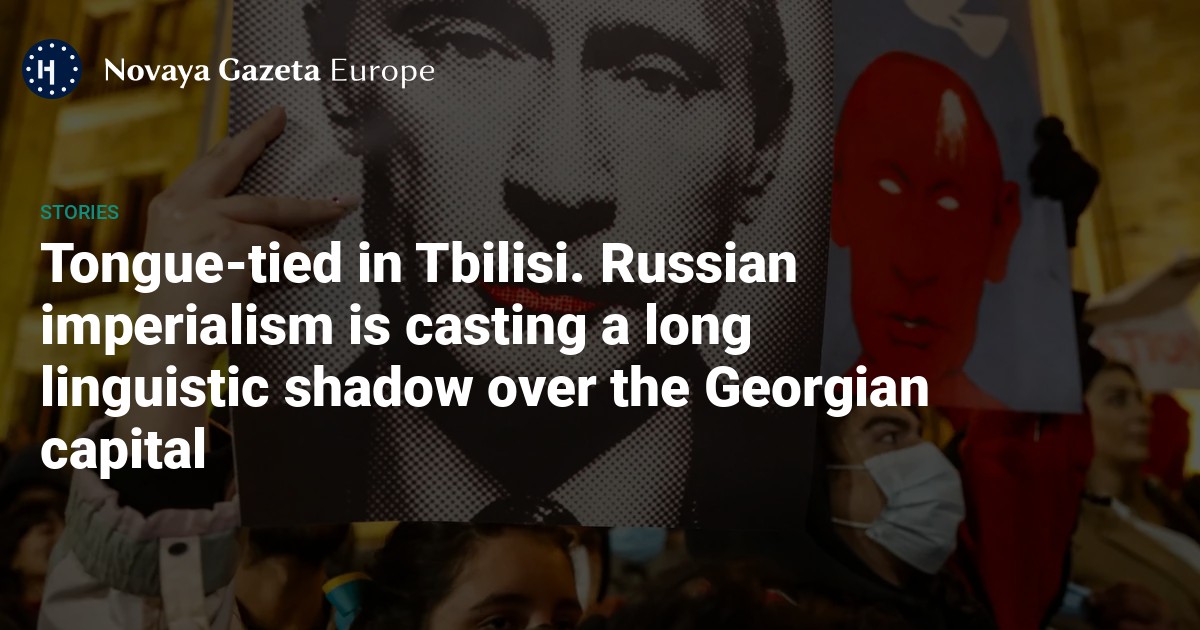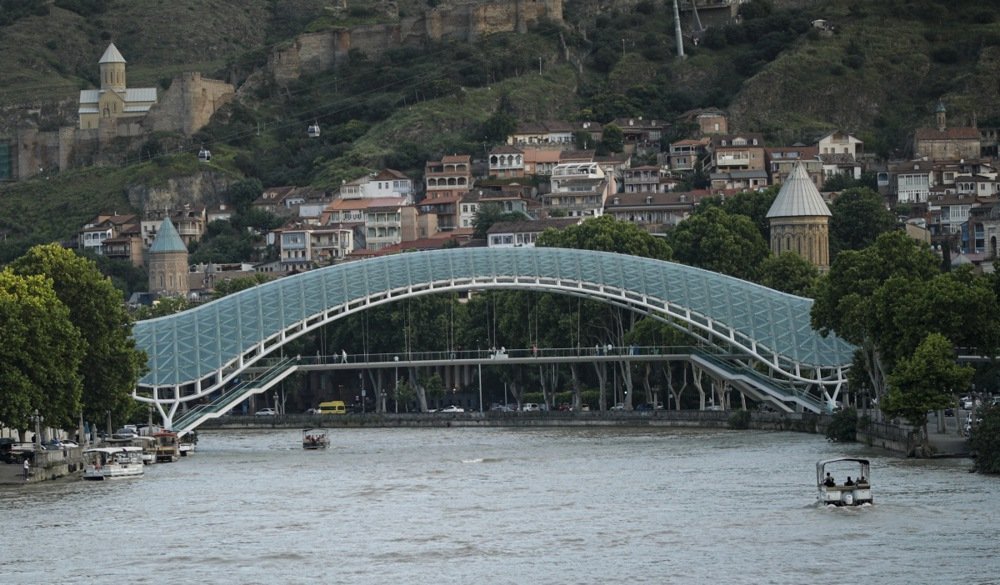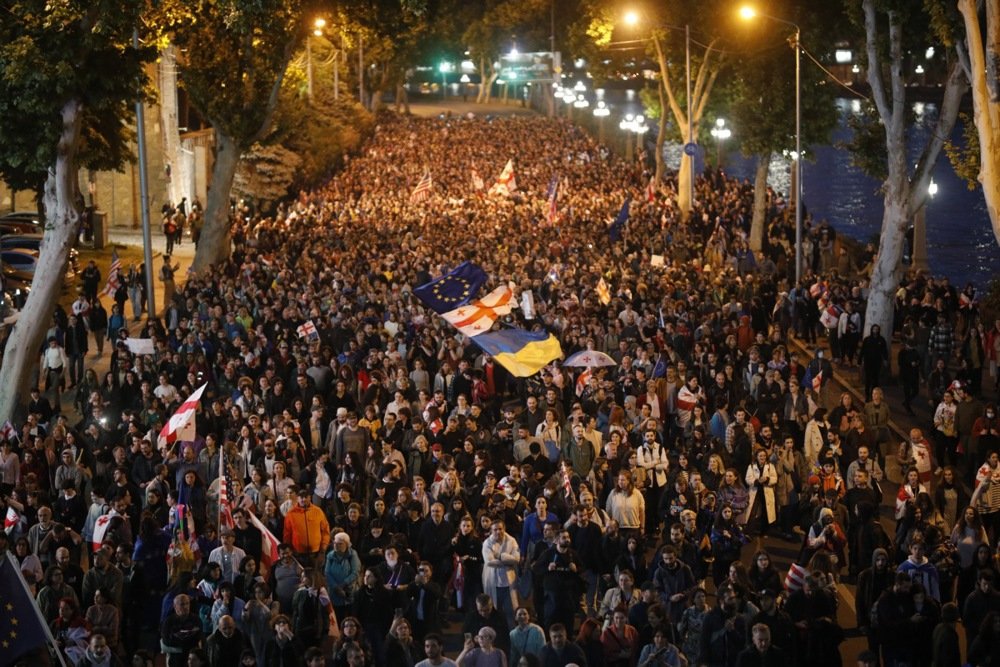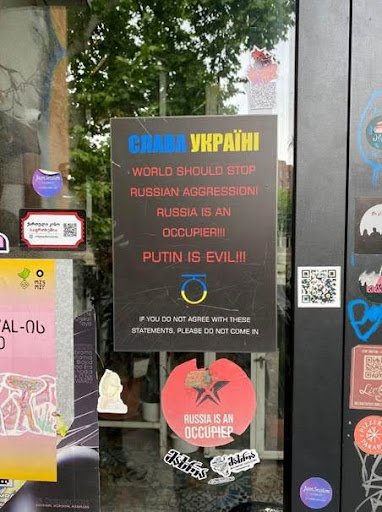



“It’s better to speak Mandarin than Russian in Tbilisi,” says Nikoloz, our guide on a Soviet-themed tour of Tbilisi, as one member of our group, a native Mandarin speaker, attempts to place an order at a street food stand in stilted Russian. Given the repression suffered over the centuries by Georgians at the hands of Russians, Nikoloz’s advice is understandable, and if speaking Mandarin doesn’t appeal, he adds that just making the effort to say madloba, Georgian for thank you, will be highly appreciated by most locals.
Far from being isolated incidents, such linguistic considerations form part of the broader social and political fragmentation in a country where language has long been a point of contention, something that has become further heightened since Putin’s 2022 invasion of Ukraine and the waves of Russian migrants who have since taken refuge in Georgia.
By the end of 2022, 110,000 Russian nationals had entered the country, according to the Georgian Interior Ministry, and though some have since left, political tensions around the continued presence of those who haven’t remain high.
Feeling like strangers in their own city, many Georgians say that the prospect of encountering the unknown is enough to stop them going into Russian-owned establishments altogether.
Many Georgians speak both Russian and English as well as their mother tongue, allowing them to choose what language to use in a variety of social situations. No longer a neutral lingua franca, Russian is a reminder to many of centuries of occupation and cultural erasure, and many Georgians now avoid speaking the language entirely as an act of political protest.
Even when Georgians do choose to speak Russian, most expect there to be an acknowledgement on the part of their interlocutor of the damaging effects of Russian imperialism and an expression of some form of anti-Putin stance.

The Bridge of Peace with Tbilisi’s old town behind it, 3 June 2024. Photo: EPA-EFE/DAVID MDZINARISHVILI
Another Tbilisi tour guide, Dato, describes going into a restaurant where he was handed a menu in Russian by staff who also addressed him in Russian. After Dato asked in Georgian for a Georgian menu, the staff switched to English and apologised for not speaking Georgian or having a menu in the national language. Dato’s reaction was to get up and leave, resolving never to set foot in the place again.
Feeling like strangers in their own city, many Georgians say that the prospect of encountering the unknown is enough to stop them going into Russian-owned establishments altogether, citing their uncertainty about what language they will be expected to speak, and what political views such choices might imply.
The influx of relatively affluent Russians has transformed central Tbilisi in particular.
Even ordering a coffee in Tbilisi today can be politically charged, requiring Georgians to cede an element of control to Russians, and several Georgians have described the situation to me as exhausting and as a linguistic tug-of-war that forces them onto the defensive.
While avoidance often becomes the solution, there are also moments of solidarity in which Russians and Georgians living in the same neighbourhoods can form ties over shared acts such as dog walking, in which language becomes a tool of tentative trust that challenges the friend-foe binary.
The language issue is tightly bound up with the financial challenges faced by many Georgians. Makvala, a Georgian academic who says that many of her compatriots feel increasingly unwelcome in their own country, insists that far from being a purely “Georgian-Russian thing”, a “nationalism thing” or an “ethnicity-based thing”, differing language use is rooted in class, “because most of the Russians who arrive here are richer than local people”.
The influx of relatively affluent Russians has transformed central Tbilisi in particular. New cafés, bars and restaurants catering to Russian tastes and budgets have popped up, driving up rents and living costs, and creating a rift between two communities whose spending habits differ significantly.
Economic pressures on Georgians have forced many of them to change their lifestyles and move to the outskirts of Tbilisi. Many Georgians now find themselves having to work two jobs to make ends meet and some have even returned to their family homes.

Georgian opposition party supporters attend a rally against the foreign agent law in downtown Tbilisi, 24 May 2024. Photo: EPA-EFE/DAVID MDZINARISHVILI
Georgian tour guides are often expected to lead groups in Russian, and it’s not unusual for Russian-speaking tourists to arrive in the country believing that Georgia remains much the same as it was in Soviet times.
The burden of linguistic politics also weighs heavily on Georgians navigating academic and professional spheres dominated by Russian speakers. Tsisia, a university professor, describes being invited to a dinner in Paris where all her fellow guests spoke to her in Russian, despite her insisting she didn’t speak the language and asking them to speak to her in English.
“I even had a heated conversation with a French scholar who was telling me that in the seventies and eighties everybody [in Georgia] spoke Russian. Then I told her … I’m here, and you see how I speak Russian. Why should you go ahead with your assumption that has no grounds?”
Tsisia describes feeling laden with the responsibility of having to prove that she doesn’t speak Russian, and also admits how demeaning she finds it that Russian scholars continue to dominate academic debate both in and of the South Caucasus.
Such expectations are common in other professional spheres as well — Georgian tour guides are often expected to lead groups in Russian, and it’s not unusual for Russian-speaking tourists to arrive in the country believing that Georgia remains much the same as it was in Soviet times, and assuming that they can and should speak to everybody in Russian. As a result, some guides, including Dato and Nikoloz, have decided only to lead tours in English on political grounds.

Two women walk past graffiti of the Ukrainian, EU and NATO flags in Tbilisi’s old town, 22 May 2023. Photo: EPA-EFE/ZURAB KURTSIKIDZE
The language question is also inseparable from Georgia’s fraught geopolitical orientation, which has become a particularly contentious issue in the past year following the reorientation of the ruling Georgian Dream party towards Moscow. Choosing between East and West, between Russian influence and what was until recently the country’s growing association with Europe, has become a polarising issue, with nightly protests in Tbilisi continuing amid accusations that Georgian Dream is mired in corruption and stole last year’s parliamentary elections.
For many Georgians, the future lies firmly with Europe. “This country to me looks more European,” Nikoloz tells me, adding that he means that more in the sense of the national mindset rather than in purely geographical terms.
“We are tired of Russian politics. We are really tired. We didn’t learn anything good from it,” Dato says, echoing the same sentiment. “What we have, what we are proud of, we learned from Europe. And we feel more like Europeans than like Asians or Russians.”
Most Georgians in Tbilisi I spoke to while researching this topic told me that they want to be able to control when they use Russian in their daily lives.
Tbilisi’s urban landscape bears witness to this ongoing conflict. Walls are covered with competing slogans, from pro-Russian to anti-Putin graffiti, in Russian, English and Georgian, while café windows and shop fronts have become canvases for political expression. Many establishments have signs defining the politics of those who may enter, with notes on the menu or even wifi names defining their clear anti-Putin and anti-Russian stances.
Language, identity and nationality have complex intersections. Some café staff will ask Russian speakers to switch to English while on the premises — a request that can be tricky for some who have grown up in other post-Soviet countries for whom Russian is their first language.
Maria, a Georgian academic, describes her experience of hearing Russian being spoken loudly in a Tbilisi café as “very irritating”, and relates how, after they began singing a song in Russian, her friend attempted to explain to them in Russian how it felt to hear such songs being sung in Tbilisi. Their reaction was to claim they were from Belarus rather than Russia itself.
Most Georgians in Tbilisi I spoke to while researching this topic told me that they want to be able to control when they use Russian in their daily lives, a key element of which is not having Russian imposed on them in their own city.

Anti-Putin posters, Dedeana Bar, Tbilisi. Photo: Georgie Archer
Encounters between Georgian natives and recently arrived Russian speakers in Tbilisi tend to involve a back-and-forth exchange until such a time that one interlocutor trusts the other enough to accommodate them linguistically to some extent. In some cases, Georgian speakers can still feel that they are being imposed upon and may decline to continue the interaction, feeling a lack of control over their everyday encounters.
Russian imperialism, the war in Ukraine, historical memory and Georgia’s contemporary political turbulence are all contributing factors to the decision made by most of my Georgian interviewees to avoid speaking Russian altogether. Most of those I spoke to said that in nearly all circumstances in which they might be expected to switch from their native Georgian, they felt imposed upon. Language choice in Tbilisi has become an emotional and political project, and one that remains nuanced, complex and easy to misinterpret.
The Russian government has banned independent media. We were forced to leave our country in order to keep doing our job, telling our readers about what is going on Russia, Ukraine and Europe.
We will continue fighting against warfare and dictatorship. We believe that freedom of speech is the most efficient antidote against tyranny. Support us financially to help us fight for peace and freedom.
By clicking the Support button, you agree to the processing of your personal data.
To cancel a regular donation, please write to [email protected]
VPNovaya
Help Russians and Belarusians Access the Truth
